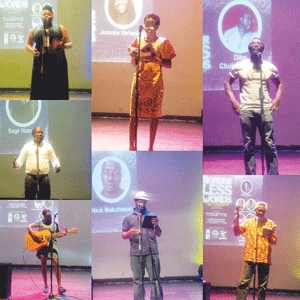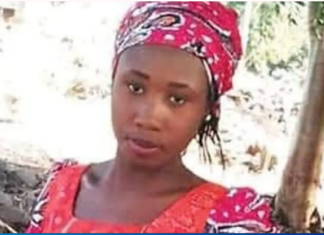It may have been the first of its kind in West Africa, but these were no baby steps taken by the Lagos International Poetry Festival (LIPF) between October 28 and November 1.
Themed ‘Borderless Words’, the festival had onsite school visits, master classes, discussion sessions and performances across different parts of the city, including the University of Lagos, Freedom Park and the Muson Centre.
The conversation with J.P. Clark had Chuma Nwokolo as moderator-cum-host. And his hospitality was complete with breaking of kolanut – offered in the form of a poem read by South African poet, Natalia Molebatsi. Once she started reading Prof. Clark’s ‘Casualties’, the die was inadvertently rolled on the board of battle. In the end, her words rang out ominously, “What do we do with the guns, after the war…?”
Prof. Clark agreed that poets could not be immune to or removed from what goes on in their country, and therefore should stand by their poetic convictions – case in point being the ‘Occupy Nigeria’ movement in 2012. But he drew the line at following one’s convictions by picking up arms.
In his words, “Warfare involves training, poetry is not the same as military action. War is waste. It should be the very last resort, and should be fought by professionals not amateurs like my friend, Okigbo.” He further spoke of how Christopher Okigbo’s ‘Path of Thunder’ established him not just as poet, but a prophet. He concluded that Okigbo wasted his life going to war – his duty lay in writing, not in fighting.
Beyond warfare, Clark responded to Nwokolo’s question about spoken word poetry and its relationship with Nigerian oral traditions by encouraging writers to get acquainted with their roots, as well as with the rules of the English language, which is the most common medium of expression. He recalled the Ozidi Saga, a tale which he was told as a child over a seven-day period; a tale which he has documented in Ijaw with his English translation side by side.
According to Clark, “None of the stories told by Homer is better than the folktales of my childhood. What is good will last, what is not will pass away. Urhobo poetry, which is sung and danced to, is timeless. It can stand beside Horace.”
The octogenarian, who informed the gathering of emerging and established writers that wine, women and song sustained him, didn’t leave without charging poets to take their craft seriously and seek perfection, as poetry is the height of literary expression.
Taking the craft seriously was a major concern in another discussion session about The Blessings and Burdens of Spoken Word. The panellists were Jumoke Verissimo, Dike Chukwumerije, Akeem Lasisi, Sage Hassan and Iquo Diana-Abasi Eke. The moderator, Uche Umez, asked what each person felt about the ongoing disparity between poets and spoken word poets, thus lighting a match that rose from a spark to a near inferno by the session’s end.
To Chukwumerije, there is poetry on one end of the spectrum, and then there is spoken word at another end. The mistake people make is comparing them in terms of which is better or higher than the other.
For Verissimo and Lasisi, it is important that spoken word be improved and documented, to enable scholars have better access to them, for the purpose of study and to help perpetuate the craft.
Eke maintained that spoken word was a performance art and should be respected as such, and since it has the capacity to tackle existential issues, steps should be taken to ensure that the words don’t fizzle away after the dazzle on stage.
Sage Hassan had totally different views in this matter. For him, spoken word is poetry, and the designation ‘spoken word’ was just a label, arrived at by shop owners who were torn between placing that brand of poetry with books or with songs. He went on to posit that he believed in art for art’s sake, and was not out to influence or change anybody, therefore would not take kindly to any group or person trying to sanction the content or form of his poetry, just so academics can find him worthy of study. Spoken word is pop culture, period!
The controversy raged, and the poets went from being ‘us’ versus the academics, to being traditional poets versus spoken word poets, until Uche Peter Umez managed to rein the panellists back into one united army with the sole aim of charting a way forward for the craft. Even if only by agreeing that this was one conversation that needed to happen.
This conversation was somewhat inconclusive, primarily because theirs is a controversy that will not end in a hurry.
After the serious talk came some serious (and sometimes naughty) poetry. Titilope Sonuga, Lebo Mashile (South Africa) and Chukwumerije were no doubt some of the top favourite performers at the event. But the event would have been incomplete without the outstanding reading and performances by Chijioke Amu-Nnadi, Nick Makoha (Uganda), Inua Ellams (Nigeria, UK), T.J. Dema (Botswana), Wana Udobang, Grraciano Enwerem, Chika Jones and Soonest Nathaniel.
Efe Paul and his team assembled a colourful selection of poets from both the oral and traditional schools over a five-day period in Nigeria’s busiest city in a feat that will last on the lips of all who came. Bravo!
• Eke is a Lagos-based award winning poet.












